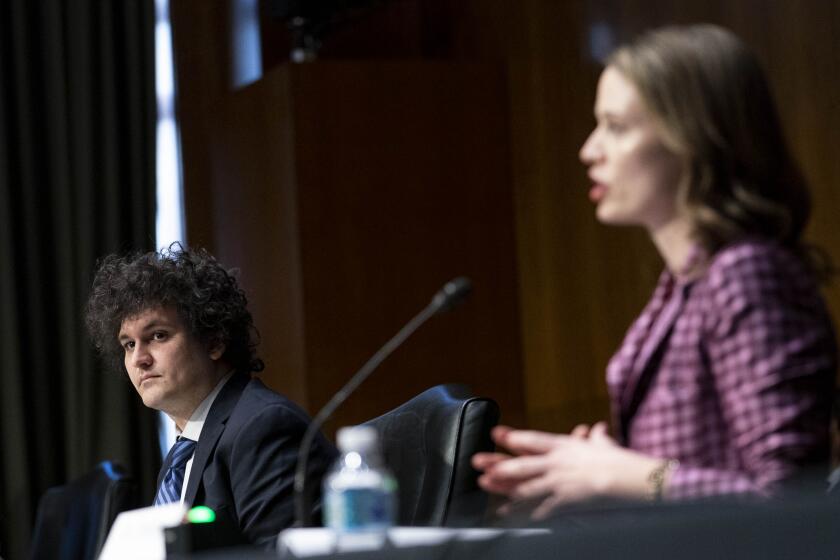Sam Bankman-Fried: ‘I didn’t ever try to commit fraud’

- Share via
Sam Bankman-Fried, the disgraced founder of the bankrupt FTX crypto empire, denied trying to perpetrate a fraud while admitting to many errors at the helm of the company.
“I made a lot of mistakes,” the 30-year-old said Wednesday by video link at the New York Times DealBook Summit. “There are things I would give anything to be able to do over again. I didn’t ever try to commit fraud on anyone.”
He was speaking in an interview with Andrew Ross Sorkin, a New York Times columnist, who said Bankman-Fried was joining from the Bahamas.
Bankman-Fried’s participation has sparked controversy given the damaging fallout from the collapse of the FTX exchange and sister trading house Alameda Research. Among the outstanding questions are how Bahamas-based FTX ended up with an $8-billion hole in its balance sheet and whether it mishandled customer funds, amid reports that FTX lent client money to Alameda.
Bankman-Fried told attendees of the summit that he “didn’t knowingly commingle funds.”
At the same time, he said that FTX and Alameda were “substantially more” linked than intended and that he failed to pay attention to the trading house’s margin position, describing it as “too large.”
He said he wasn’t running Alameda and added that he was “nervous about a conflict of interest.”
Some observers speculate that Bankman-Fried’s public comments could be used against him in litigation. The fallen former FTX chief executive faces a complex web of lawsuits and regulatory investigations into alleged wrongdoing.
The digital-asset sector is braced for widening contagion from FTX, which once boasted a $32-billion valuation before sliding into bankruptcy Nov. 11. It owes its 50 biggest unsecured creditors a total of $3.1 billion, and there may be more than a million creditors globally.
Sam Bankman-Fried’s $16-billion fortune was always a myth. The mystery is why venture firms and the financial press thought it existed.
A crypto lender, BlockFi, filed for bankruptcy Monday after being buffeted by the wipeout. Embattled brokerage Genesis is striving to avoid the same fate.
BlackRock CEO Larry Fink said earlier at the DealBook Summit that most crypto companies will probably fold in the wake of FTX’s collapse. The world’s biggest asset manager was among the firms stung by the chaotic unraveling of Bankman-Fried’s tangled web of 100-plus FTX-related entities.
Bankman-Fried has provided convoluted and incomplete explanations on social media and in interviews with other news outlets about what led to FTX’s woes. Advisors overseeing the ruins of his business have slammed nonexistent oversight and the misuse of client funds.
FTX’s new CEO, John J. Ray III, a turnaround and restructuring expert who formerly oversaw the liquidation of Enron Corp., told the U.S. Bankruptcy Court that he’d never in his career “seen such a complete failure of corporate controls and such a complete absence of trustworthy financial information.”
As if such travails weren’t enough, the exact breakdown of a $662-million outflow from FTX as it tumbled into bankruptcy remains a mystery. Bankman-Fried said in the summit interview that there was improper access to FTX after its spiral.
Treasury Secretary Janet L. Yellen, another speaker at the summit in New York, called the FTX debacle “the Lehman moment within crypto,” referring to the collapse of investment banking giant Lehman Bros. in 2008.
Crypto markets have stabilized somewhat after lurching lower in November as the turmoil around FTX thickened. Even so, a gauge of the top 100 tokens is down more than 60% this year, hit by tightening monetary policy and a series of crypto blowups of which FTX is the most spectacular.
Bloomberg staff writers Allyson Versprille, Jenny Surane, Gregory Korte and Annie Massa contributed to this report.







